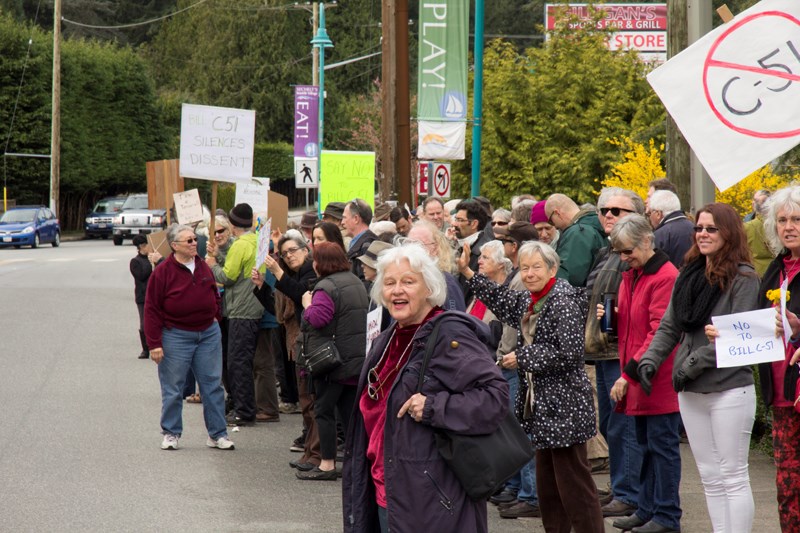Tens of thousands of Canadians participated in dozens of protests across the country against the controversial Bill C-51, last Saturday (March 14).
More than 200 residents from around the Sunshine Coast convened outside Conservative member of Parliament John Weston’s office in Sechelt to oppose the proposed anti-terrorism act.
“It’s the worst bill I’ve seen out of any government in Canada,” said protester Lynn Chapman. “It’s anti-Canadian. It seeks to silence voices that are different from the opinions of the government. And it puts normal citizens — Canadians — at risk of being labeled terrorists because they hold views that may not be the same as the governments’ views. That’s wrong. Wrong on so many levels.”
Weston, MP for West Vancouver - Sunshine Coast - Sea to Sky Country, responded to concerns in an interview on Wednesday.
“Bill C-51 does not create a Canadian James Bond,” Weston said. “It is instead designed to protect Canadian security so that we can enjoy our freedom. Yes, it is designed to strike at one kind of freedom — the freedom of terrorists to operate against Canadian interests.”
The actual bill is more than 60 pages long, but British Columbia Civil Liberties Association (BCCLA) caseworker Alyssa Stryker and senior counsel Carmen Cheung created a summarized document (available on their website) which highlights eight important features of Bill C-51.
Among these concerns are new definitions of the word security.
“Bill C-51 defines security as not only safeguarding public safety, but also preventing interference with various aspects of public life or ‘the economic or financial stability of Canada,’” wrote Stryker and Cheung.
Many Canadians feel that this could easily be applied to peaceful demonstrations against logging or pipeline expansion. Simply participating in a protest like the ones against LNG pipelines, many fear, could lead to charges of terrorism under Bill C-51.
But Weston dismissed this fear.
“A protest, even without a valid municipal permit, would not qualify,” he said. “As such, CSIS [the Canadian Security Intelligence Service] can only investigate lawful advocacy, protest or dissent if it is carried out in conjunction with a threat to the security of Canada.
“The bill clearly states that any activity undermining Canada’s security does not include lawful advocacy protests, dissent or artistic expression. If a person joined with Islamic State (ISIS) was deliberately disrupting our computer systems, who was advocating a breakdown of our financial systems … consistent with the requests or encouragement of a terrorist organization like ISIS — that would be a terrorist activity and that would be eligible to be investigated and impeded by CSIS.”
The bill does grant CSIS more direct power. Traditionally CSIS has been officially restrained from anything more than intelligence gathering, but Bill C-51 would allow Canada’s intelligence officers to operate more or less as a police force.
“CSIS was created in the 1980s for the express purpose of separating Canada’s intelligence agency from its police force,” wrote Stryker and Cheung. “As an intelligence agency, CSIS is permitted to conduct much of its work in secret, and the details of most of its activities are never revealed publicly.
“But that’s precisely why CSIS should not be permitted to also operate as a police force,” they wrote. “This secrecy means that rights violations by CSIS are more difficult to detect — and once detected, more difficult to remedy — than if they were the result of actions undertaken by law enforcement agencies.”
But Weston disagrees.
“Bill C-51, the Government’s Anti-Terror Law, is the most comprehensive security-related law that I have seen, carefully attempting to balance freedom and security. It strikes directly at the technology, flow of information and travel patterns of terrorists. It updates our relevant agencies to deal with current circumstances,” Weston said.
Bill C-51 has passed its first two readings and is currently awaiting review from the Public Safety Committee on March 23.



